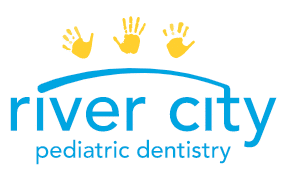Pediatric dentistry is a dental specialty that focuses on improving and maintaining a child’s oral health and development. These specialists provide thorough exams and preventive care at regular intervals to children from infancy through adolescence, including those with special needs. They also provide education to teach parents about proper oral care for their children.
At River City Pediatric Dentistry, we work closely with patients and their parents to ensure the health and well-being of growing smiles. Through a passion for our work and a love for working with children, you can be sure you’ve come to the right place for your child’s dental needs. To schedule an appointment, call our office today!
Pediatric Cleanings & Exams
When visiting our office for a pediatric cleaning and exam, we will first explain what is going to happen and answer any of your questions. During this visit, our team will perform a thorough cleaning of your child’s teeth. This includes removing plaque and tartar, which can lead to tooth decay or cavities. We may also use special tools to polish your child’s teeth after the cleaning.
Once this is complete, your child will have an oral examination performed. This is where we use a light to look closely at all of the surfaces inside your child’s mouth. We will check for things like cavities, gum disease, cysts, and infections. After this, we will tell you if your child needs any other treatments.
Remember that we are here for you and your child’s comfort. Our team members enjoy working with children and are very good at making them feel calm during procedures. If you have any questions or concerns about what is going to happen during a pediatric dental cleaning and examination, be sure to speak with us during your child’s visit.
Professional Athletic Mouthguards
Child athletes are at risk of serious injuries when playing sports, including dental trauma. According to the American Association of Orthodontists (AAO), dental traumas account for approximately 23% percent of sports-related injuries in children and adolescents. According to the American Dental Association (ADA), “Nearly three out of every four dental injuries in young athletes are preventable with proper equipment.” Therefore, it’s important that children wear custom-fitted mouthguards when participating in sports. We provide these devices in our office and recommend they be worn during all contact sports, such as football, hockey, and lacrosse.
A custom-fitted mouthguard is a specially-made appliance that covers teeth to prevent the upper teeth from contacting the lower teeth or jaw during a sports impact. When fitted properly, a custom-fitted mouthguard cushions an athlete’s teeth – protecting them from damage if they are hit during a sports activity. The fit of the mouthguard ensures teeth remain in proper alignment and reduces concussions, lacerations, and jaw fractures. A poorly fitted mouthguard will not absorb impact forces properly, leaving the child vulnerable to dental injuries. When selecting a protective appliance, consider the following factors:
- Material – Custom-fitted mouthguards are made from a specially-formulated dental impression material, which is fitted over the upper teeth and retained by suction inside the mouth. The material may be composed of a soft or medium-based polymer solution or a thermoplastic material.
- Thickness – The recommended thickness of a custom-fitted mouthguard is at least 3 millimeters, as it provides adequate shock absorption and protection from impact forces. A thinner mouthguard may crack if hit and should not be used for contact sports.
- Fit – The best fit is achieved when the mouthguard is purchased directly from a dental care provider, rather than a purchase made in a store or online. The custom-fitted appliance should be easy to clean, comfortable to wear, and be able to provide a cushion that absorbs impact forces.
Wisdom Teeth Removal
Wisdom teeth are also known as the third molars; these four teeth are located in each of the back corners of the mouth. As the last teeth to come in, wisdom teeth do not typically emerge until roughly 18 years of age. Due to the latency of emergence with these teeth and the lack of space available in the mouth, they often cause problems. These issues may include:
- Nerve damage – The roots of neighboring molars may become damaged as wisdom teeth press against these nerves and create cavities.
- Crowding – When your child’s jaw is too small for their adult teeth, overcrowding occurs, which means wisdom teeth can grow in at an angle.
- Impaction – Wisdom teeth that have grown in incorrectly often become impacted, blocking other adult teeth from coming in.
Once these issues arise, your child may experience varying degrees of discomfort. Symptoms might include pain, swelling, infection, decay, or gum disease. The most common symptom is an ache in the lower back region of the mouth or jaw. In most cases, our team is able to monitor the growth and positioning of these teeth and plan for removal before these symptoms occur.
Extractions are performed surgically while your child is under sedation and anesthetic.
- After locating the position of the teeth with an x-ray, we will create a small incision through the gum tissue in the back of the mouth, above the wisdom tooth/teeth requiring removal.
- The wisdom tooth will be removed through this opening.
- The area will then be cleaned and sutured closed for healing.
Our office does not perform this procedure; however, we are able to provide oral surgeon referrals if treatment is needed.
Education For Parents & Kids
Pediatric dentists receive training in regard to the care of infants, children, and teenagers, as well as knowledge about all aspects of dentistry. Their expertise allows them to deliver dental care that is tailored to the particular needs of their young patients.
One of the most valuable services we provide is our personalized feedback and education offered to parents and kids. We assist in understanding many basics of dental care, as well as how to accommodate specific concerns for children; this includes the following:
- Brushing techniques
- Best toothpaste for a particular child
- How to floss properly
- Helpful nutritional guidance
- Breaking problematic habits (thumb sucking, nail-biting, etc.)


